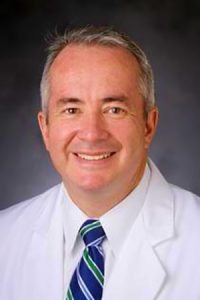VOLUNTEER MEDICAL DIRECTOR: RICHARD NOEL, MD
Published by Feeding Matters on Mar 01, 2021

We are excited to share with you our volunteer Medical Director for the 2021-2022 term, Dr. Richard Noel. We also would like to ardently thank Dr. Jaime Phalen, our previous volunteer Medical Director who served in many capacities to advocate for children with PFD over the past few years and remains a close advisor.
Our Medical Director, and all of our PFD Alliance leadership is committed to creating a world in which children with PFD thrive. Additionally, they support Feeding Matters’ philosophy that: we believe families are an equal and valued member of the treatment team and should be respected in this way; we view PFD as a multi-facet challenge comprised of 4 domains; we recognize the need for evidence-based practices; and we believe all sectors are influential and multiple perspectives are necessary to create a functional system of care.
Our CEO, Jaclyn Pederson, recently sat down with Dr. Noel to learn more about his passion for children with PFD.
Tell our feeding community a little bit about yourself. How did you come to practice GI medicine? How did you get involved with Feeding Matters?
As all medical students, I was exposed to all medical and surgical fields and found pediatrics to be the most fun and rewarding. Once in a pediatric training, I found pediatric GI to be the most interesting and decided to pursue additional formal GI fellowship training. It was during this time in Cincinnati that I was initially exposed to pediatric feeding disorder and aerodigestive diseases, both within programs that were the legacy of Dr. Colin Rudolph.
Upon completion of my GI training, I moved to Milwaukee to work with Dr. Rudolph where I learned much more about pediatric feeding disorder from Dr. Rudolph and the active group of interdisciplinary colleagues he organized. I met Shannon Goldwater and Chris Linn and became formally involved with Feeding Matters in 2010, following the initial involvement of Dr. Rudolph and other colleagues with the nascent stages of what grew to be this amazing advocacy organization.
How do you see the PFD consensus definition changing care for our children with PFD?
Feeding problems in children are not new and many have attempted to define them, typically from a perspective that is limited to their own field. Apparently disparate terms like dysphagia, malnutrition, ARFID, infant anorexia, all probably refer to similar things, but are limited by the narrow scope of practice of those who generated them.
The 2019 consensus definition organized by Feeding Matters is the first truly multidisciplinary construct that recognizes the many elements that form pediatric feeding disorder. Furthermore, this consensus definition is written according to the International Classification of Functioning, Disability and Health (ICF), recognizing the disability that can accompany PFD, but has been poorly recognized in considering access to therapies and special accommodations by schools and other settings.
PFD is best managed by an interdisciplinary team where the family is primary. Based on your experience as a gastroenterologist, why do you feel a team-based approach is so important?
The nature of PFD is that relevant issues in a given patient may fall outside the scope of practice in a single discipline (i.e., a gastroenterologist may have expertise in issues relating to the upper GI tract of a child but does not have the same understanding regarding the mechanics of swallowing). It is by this necessity that team-based care is always best, whether in an interdisciplinary team at a large referral center, or a smaller group of specialists who work apart, but form a “virtual team” that can still address all relevant issues of a child with PFD.
What advice would you give the feeding community to help them access or provide optimal care for children with PFD?
Families of children with PFD need to be educated consumers who can push their providers to ensure all relevant needs are met. Do we need a referral to a psychologist? Do we need to enroll a dietitian who can help a feeding therapist broaden the choices of food with a given texture? Sometimes, it takes an educated family to push a provider to become better at managing a complex problem, such as PFD.
We have asked several questions about your connection to PFD. Please share something about yourself that we may find surprising, or we might not know.
I was born in Mexico City and Spanish was my first language. We moved to San Antonio, TX when I was 9 years old, and I always benefited from my family’s bicultural perspective on issues.